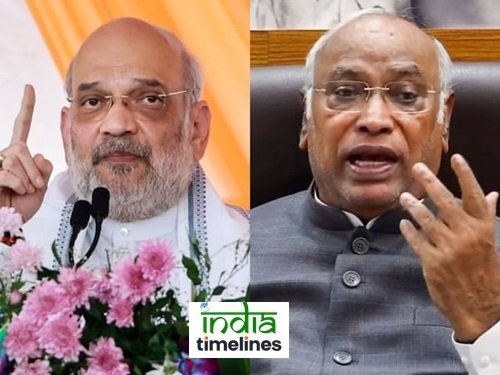
In a striking escalation of political rivalry, Home Minister Amit Shah delivered a stinging rebuke to Congress President Mallikarjun Kharge following controversial remarks made during a recent rally in Jammu and Kashmir. The comments, aimed at Prime Minister Narendra Modi, have sparked widespread debate and drawn sharp responses from various quarters of the Bharatiya Janata Party (BJP). This confrontation reflects the deep-rooted animosity between India’s two largest political parties, with Shah taking an aggressive stance in defense of PM Modi’s leadership.
Amit Shah’s Fiery Response: Defending Modi’s Legacy
During a fiery address, Amit Shah took Kharge to task over his “unwarranted and baseless” comments targeting the Prime Minister. Shah, a long-time associate of Modi, accused Kharge of indulging in spiteful rhetoric that undermined the contributions and efforts made by Modi in transforming India. Shah’s defense was not just a response to Kharge’s verbal attack but also an effort to showcase the BJP’s achievements under Modi’s tenure.
Shah criticized the Congress party for using personal attacks as a political tool, stating, “When they can’t fight us on the basis of development, they resort to insults and personal attacks.” He further emphasized that such remarks only highlight the Congress’s frustration and desperation in the face of Modi’s immense popularity and his successful governance model.
Kharge’s Remarks: What Sparked the Controversy
The controversy began when Congress President Mallikarjun Kharge made comments at a public rally in Jammu and Kashmir, in which he questioned the Prime Minister’s contributions to the nation. Kharge alleged that Modi’s government had failed to deliver on many promises, particularly in sensitive regions like Jammu and Kashmir. His speech was filled with sharp criticism aimed at both Modi’s domestic and foreign policies, insinuating that the BJP had created more divisions in India than it had united.
Kharge’s remarks were seen by the BJP as an attack on Modi’s integrity and his administration’s track record in governance. The Congress leader accused the Modi government of prioritizing rhetoric over action, particularly in relation to the volatile situation in Jammu and Kashmir, where tensions remain high despite several initiatives launched by the government to restore peace and stability.
The Role of Jammu and Kashmir in Political Debates
Jammu and Kashmir, a historically sensitive region, has long been a focal point of political contention between the Congress and the BJP. The BJP has repeatedly highlighted the abrogation of Article 370, which granted special status to the region, as one of its key accomplishments under Modi’s leadership. For the BJP, this move represented a significant step towards national integration and the strengthening of India’s territorial unity.
In contrast, the Congress party has been highly critical of the BJP’s handling of Jammu and Kashmir, accusing the government of creating further alienation among the people of the region. Kharge’s latest remarks reflect this ideological divide, as he questioned the efficacy of the BJP’s policies in restoring normalcy in Jammu and Kashmir. Kharge hinted that the abrogation of Article 370 had not led to the promised benefits, a claim vehemently rejected by the BJP.
Political Fallout: Strengthening BJP’s Nationalist Image
Amit Shah’s counterattack aimed to capitalize on the situation by projecting the BJP’s nationalist credentials. In defending Modi’s leadership, Shah reiterated the BJP’s commitment to national security and regional stability. He accused the Congress of not just undermining the Prime Minister but also attempting to weaken India’s position on critical national issues. According to Shah, “Kharge’s remarks are not just about Modi; they are about questioning the very fabric of India’s unity.”
Shah’s speech was also a clear attempt to rally BJP supporters, especially in a region where the party has sought to consolidate its base. By framing the issue as one of national pride and security, Shah sought to shift the narrative away from Kharge’s criticisms towards the BJP’s successes in keeping India secure, both from internal threats and external adversaries.
Congress-BJP Rivalry: A Long-Standing Feud
The Congress and BJP rivalry is nothing new to Indian politics. For decades, these two political giants have been locked in a battle for supremacy, with each election cycle serving as a fresh battleground for their ideological differences. While the Congress positions itself as the champion of secularism and inclusivity, the BJP has built its identity around nationalism and Hindutva ideology.
The latest exchange between Shah and Kharge is a continuation of this rivalry, with both leaders attempting to define the legacy of Prime Minister Modi and the future of Indian governance. The BJP, under Modi and Shah, has been keen to portray the Congress as a party out of touch with the aspirations of modern India, while the Congress has repeatedly attacked the BJP for what it calls authoritarian tendencies and divisive policies.
Impact on Upcoming Elections
The sharp exchange between Shah and Kharge comes at a time when elections loom large in several key states, including Jammu and Kashmir. Both parties are looking to make significant inroads in this politically crucial region. For the BJP, PM Modi’s popularity remains a central pillar of their campaign strategy, and any attack on his leadership is met with a swift and robust defense. The Congress, on the other hand, is trying to regain lost ground by focusing on what it calls the failures of the Modi government in addressing key issues like unemployment, inflation, and regional conflicts.
Shah’s response to Kharge’s remarks is likely to play well with the BJP’s core voter base, which appreciates the party’s strong stance on national security and economic development. The Congress,
meanwhile, will need to counter this by providing a viable alternative vision for India’s future, something that has been a challenge for the party in recent years.
Conclusion: A Battle of Ideologies
The war of words between Amit Shah and Mallikarjun Kharge is more than just a personal feud; it is emblematic of the larger ideological battle being fought between the BJP and Congress. At the heart of this battle is the question of India’s future direction. While the BJP continues to push its narrative of national strength and economic progress, the Congress is positioning itself as the defender of democratic values and social justice.
As both parties gear up for the next round of elections, the political landscape in India is set to become even more charged, with sharp exchanges like this one likely to dominate public discourse. Shah’s staunch defense of PM Modi and Kharge’s pointed criticisms of the BJP are just the latest chapter in a long-standing rivalry that shows no signs of abating a

























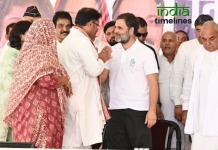




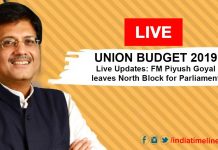


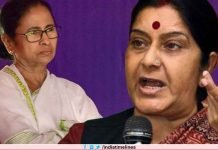


wnk62c
r7cdde
Howdy! I know this is kind of off topic but I was wondering if you knew where I could find a captcha plugin for my comment form? I’m using the same blog platform as yours and I’m having difficulty finding one? Thanks a lot!
ctva5e